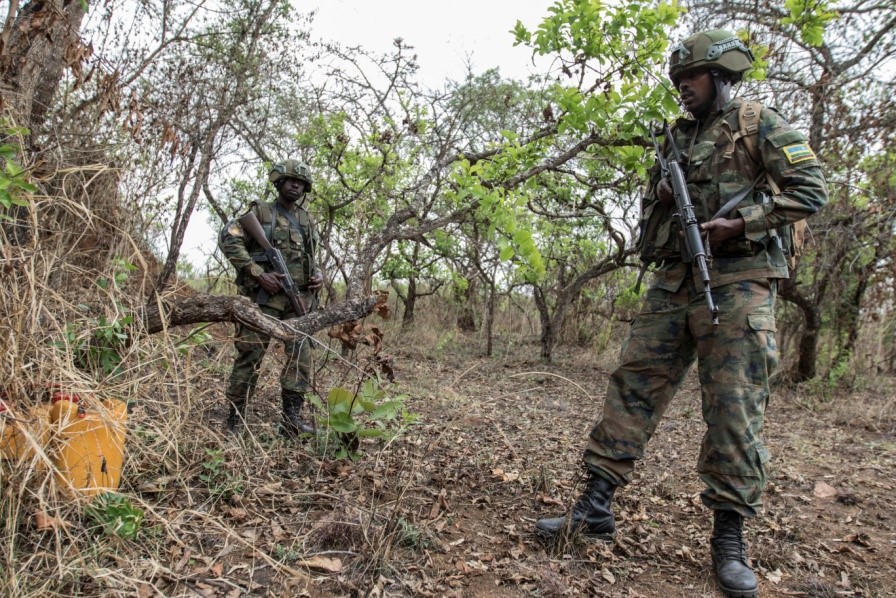
Unlike the Russian mercenaries, Rwandan soldiers, such as the ones depicted here during a training exercise, made significant progress against terrorists in Mozambique.
“The failed intervention in Mozambique by the Russian private military company, the Wagner Group, took place amid serious disagreements between the company and the Mozambican military.”
Mozambique’s northernmost province, Cabo Delgado, has been under attack by Islamist insurgents since 2017. Initially the government declined offers of outside help by other nations, instead depending on its own military, which was poorly equipped and not well trained in counterterrorism or counterinsurgency tactics. As the excerpted article from the South African think tank Institute for Security Studies notes, Mozambique turned to Russia for help after two years of disastrous results. In September 2019, Russian military contractor Wagner Group arrived in Cabo Delgado.
The terms of the agreement with Wagner Group were never made public. However, the Russian mercenaries were only in Cabo Delgado for about two months. Apparently they wanted to bomb various locations where terrorists were purportedly located. This strategy was at odds with what their Mozambican counterparts had planned. Also, during their short time in Mozambique, a number of the Russians were killed, reportedly including some who were beheaded during botched missions. The abrupt departure of Wagner Group personnel has been attributed to their failures and possibly confusion sown by the discord between the Wagner Group and Mozambican military. Mozambique next turned to the South Africa-based Dyck Advisory Group (DAG). In April 2020 DAG arrived in civilian helicopters converted into gunships. While helpful, it was unable to stem extremist attacks. One year later DAG was gone and replaced by trainers and advisers from a South Africa-Dubai consortium. However, as the article explains, it was not until Mozambique finally agreed to let foreign troops, beginning with a relatively large contingent from Rwanda, assist in the fight, that real progress was made against the insurgents, including dislodging them from their bases. While it is not clear why Wagner Group and DAG were not more effective, it appears that that unlike the mercenaries, trained militaries from other nations made swift and significant gains against the Islamists.
Source:
Borges Nhamirre, “Will foreign intervention end terrorism in Cabo Delgado?” Institute for Security Studies (a South African think tank) 5 November 2021. https://issafrica.org/research/policy-brief/will-foreign-intervention-end-terrorism-in-cabo-delgado
The failed intervention in Mozambique by the Russian private military company, the Wagner Group, took place amid serious disagreements between the company and the Mozambican military.
Faced with the inability of government forces to stop the insurgency, even with private military support, liberation struggle veterans in Maconde-dominant districts of Cabo Delgado formed local militias to fight the insurgents. The contribution of the militias has not yet been studied in depth, but it seems that they were useful in blocking the insurgents’ advance towards districts such as Mueda and Muidumbe.
Rwanda’s quick achievements were due to better combat experience, but also better equipment, which allowed them great superiority over the insurgents. While the insurgents’ bases had already been identified by the Mozambican military, they did not have the capability to dislodge the insurgents. The attempts that had been carried out in the past had resulted in failures and in some cases, tragedies.
Despite progress in combating violent extremism in Cabo Delgado, there is still a long way to go. After more than a decade of the radicalisation of local populations and a multi-year armed insurgency, three months of foreign intervention is just the start of the process towards building peace and stability in Cabo Delgado.
Image Information:
Image: Unlike the Russian mercenaries, Rwandan soldiers, such as the ones depicted here during a training exercise, made significant progress against terrorists in Mozambique.
Source: Sgt. Heather Doppke/SETAF/Flickr, https://www.flickr.com/photos/usarmyafrica/48640726723/
Attribution: CC BY 2.0
